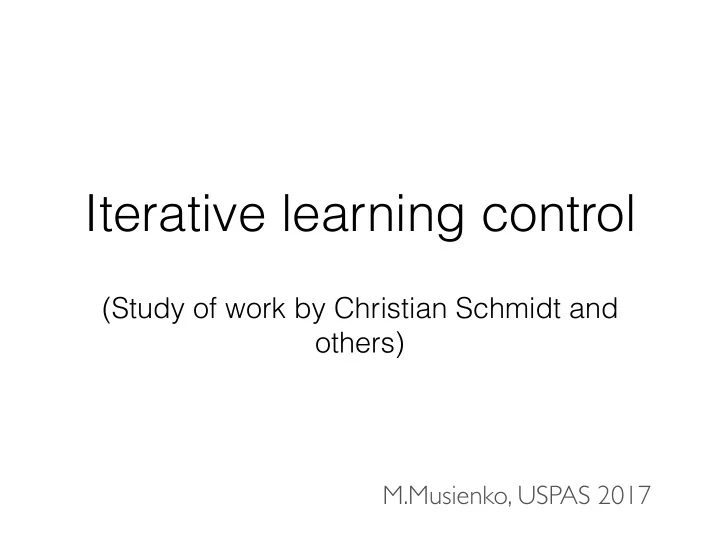

Iterative learning control (Study of work by Christian Schmidt and others) M.Musienko, USPAS 2017
Free Electron Laser in Hamburg (FLASH) at DESY • pulsed RF Operation due to the thermal losses
FLASH LLRF
Disturbances - microphonic • typically in a range up to a few hundred hertz, which in pulsed operation appears as fluctuations from pulse-to- pulse. The amplitude or resonance frequency change for FLASH type of cavities is typically σ A ∆ f ≈ 6 Hz • Can use (mechanical) feedback loop to compensate
Disturbances - Lorentz force detuning • stronger resonance frequency deviation • If the RF field does not change from pulse-to-pulse, the deformations will show almost the same behavior • For the pulsed operation mode only the transient response is measurable (Deformations are disappeared before the next pulse starts, so the effect is repeated with the next pulse)
Disturbances - beam loading • repetitive disturbance source, therefore predictable (if operation state remains) • Shown with proportional feedback loop closed
RF open-loop response and feedback control • Proportional gain controller has limit gain due to measurement noise and HOM (8/9 pi mode) • Phase lag due to digitalization • Tradeoff between in-pulse and pulse-to-pulse errors • Out of scope - designing a MIMO feedback controller via generalized plant and weighting filter with HIFOO - see [1]
Feedforward control • Residual field errors due to the low BW of the feedback loop and limitations on the gain • Predictable disturbance - can compensate with RF modulation • How to calculate? Constant during operation? Optimal? Iterative learning control - take information from previous trials to optimize the control inputs on the next trial
FLASH LLRF - NOILC Feed forward
Norm-optimal iterative learning control • General iterative control - to ensure some error metric • Given a system • NOILC - optimize uk+1 iteratively per selected performance index
NOILC - solution • Problem stated has a solution [2]: • Matrix gain • Predictive component • Input update
Implementation note - F-NOILC • Extensive calculations to update input values. • Can rearrange for pre- calculation of a lot of terms in advance and minimize real-time calculations • Note - need to recalculate with model changes (if any) • See for ex. [3]
Out of scope - system identification • Requires A, B, C, D… • Black-box model for system identification • Model validation
Experimental results - open-loop ILC (no beam, LFD only) System input u k (t) System output y k (t)
Experimental results - closed-loop ILC (P controller) • Fitted curves of RF field amplitude changes due to feedforward adaptation • Dots represent the measurement points after 50 iterations showing that only non repetitive fluctuations are left over
Experimental results - ILC convergence (P controller)
Experimental results - pulse train energy spread (P controller)
ILC and MIMO controller
ILC long term adaptation • I/Q domain • yellow dot - data point • red dot - 5 sample average • yellow/red ovals - rms error • black oval - system requirement • System converges nicely. what happen next as iteration number increase?
ILC long term adaptation (cont.) • ILC induced oscillations • What can caused this?
ILC - implications of model limitation • Spectrum analysis of vector sum shows that as iterations increase, peaks occur at frequencies consistent with 8/9pi mode of the cavity • Limitation of the system model used for ILC derivation
References Following references were used in this presentation for strictly educational purpose: [1] C. Schmidt (2010): RF System Modeling and Controller Design for the European XFEL (Doctoral thesis) [2] N. Amann, D.H. Owens, E. Rogers: Iterative learning control for discrete-time systems with exponential rate of convergence , IEE Proc. Control Theory Appl., vol. 143, no. 2, pp. 217224, 1996. [3] J.D. Ratcliffe, P.L. Lewin, E. Rogers, J.J. Htnen, D.H. Owens: Norm-Optimal Iterative Learning Control Applied to Gantry Robots for Automation Applications , IEEE Transactions on Robotics, Vol. 22,No. 6, 2006
Recommend
More recommend